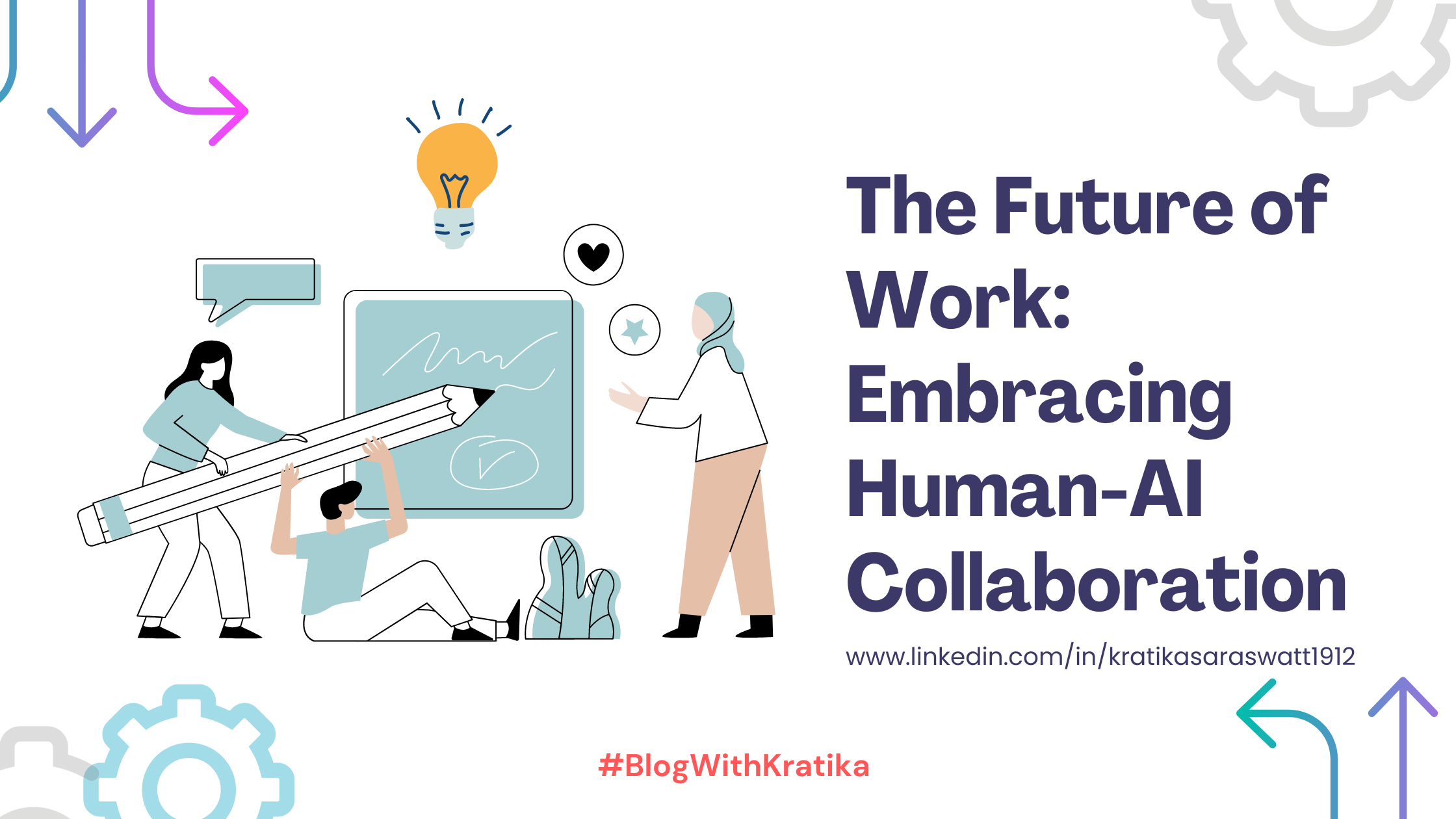The Future of Work: Embracing Human-AI Collaboration
 Kratika Saraswat
Kratika Saraswat
In an age where technology evolves at breakneck speed, the integration of Artificial Intelligence (AI) into our daily lives and work environments is no longer a distant possibility but a present reality. Human-AI collaboration is emerging as a crucial area of interest, driving innovations that augment human capabilities, enhance decision-making, and boost productivity across various domains. This blog explores the multifaceted ways in which humans and AI can collaborate effectively, and the potential this synergy holds for the future.
Augmenting Human Capabilities
One of the most significant benefits of AI is its ability to enhance human capabilities. AI tools can process vast amounts of data at lightning speed, uncovering patterns and insights that would be impossible for humans to discern unaided. This augmentation is particularly evident in fields such as healthcare, education, and creative industries.
Healthcare
In healthcare, AI-powered diagnostic tools assist doctors in identifying diseases earlier and with greater accuracy. For example, AI algorithms can analyze medical images to detect conditions like cancer, sometimes even outperforming human specialists. Additionally, AI can predict patient outcomes and suggest personalized treatment plans, allowing doctors to make more informed decisions and provide better care.
Education
In education, AI-driven platforms offer personalized learning experiences, adapting to each student's pace and style of learning. These tools provide educators with insights into student performance, highlighting areas where individual students may need extra help. By automating administrative tasks, AI also frees up teachers to focus more on instruction and student engagement.
Creative Industries
AI is making waves in the creative industries as well. From generating music and art to assisting in the writing process, AI tools are proving to be valuable partners. For instance, writers can use AI to brainstorm ideas, refine their prose, and even detect grammatical errors. Musicians and artists can experiment with AI-generated compositions or artworks, pushing the boundaries of creativity.
Improving Decision-Making
AI excels at analyzing complex datasets and providing actionable insights, making it an invaluable tool for decision-making in various sectors, including finance, logistics, and public policy.
Finance
In finance, AI algorithms analyze market trends, economic indicators, and even social media sentiment to make investment recommendations. By identifying patterns and anomalies that humans might miss, AI helps investors make more informed and timely decisions, potentially leading to higher returns and reduced risks.
Logistics
Logistics companies leverage AI to optimize supply chains, predict demand, and manage inventory. AI-driven predictive analytics can foresee potential disruptions and suggest proactive measures, ensuring smoother operations and cost savings. This kind of decision support is crucial in a globalized economy where efficiency and agility are paramount.
Public Policy
Public policy makers use AI to analyze the potential impacts of legislation, predict economic and social outcomes, and even model scenarios for crisis management. For example, during the COVID-19 pandemic, AI was instrumental in tracking the spread of the virus and assessing the effectiveness of various containment measures.
Enhancing Productivity
The integration of AI into workplaces is transforming how we approach productivity. By automating repetitive tasks and providing intelligent support, AI allows humans to focus on higher-value activities that require creativity, critical thinking, and emotional intelligence.
Automation of Repetitive Tasks
AI-powered automation handles routine tasks such as data entry, scheduling, and customer service inquiries. Chatbots, for instance, can manage a large volume of customer interactions, providing quick responses and freeing up human agents to handle more complex issues. This not only increases efficiency but also enhances customer satisfaction.
Intelligent Support Systems
In the workplace, AI acts as an intelligent assistant, helping employees manage their time, organize information, and collaborate more effectively. Tools like smart calendars, project management software, and collaborative platforms integrate AI to provide reminders, suggest priorities, and streamline workflows.
Innovation and Problem Solving
AI also fosters innovation by offering new ways to approach problem-solving. By simulating scenarios and testing hypotheses, AI can inspire novel solutions and strategies. This collaborative innovation is seen in industries ranging from pharmaceuticals, where AI helps in drug discovery, to engineering, where it aids in designing more efficient systems and structures.
The Future of Human-AI Collaboration
As AI technology continues to evolve, its role in our lives and work will only grow more significant. To maximize the benefits of human-AI collaboration, it is essential to address challenges such as ethical considerations, data privacy, and the need for continuous learning and adaptation.
Ethical Considerations
Ensuring that AI is developed and used ethically is paramount. This involves creating transparent algorithms, preventing biases, and ensuring accountability. Collaboration between technologists, ethicists, and policymakers is crucial to establish guidelines and frameworks that protect individuals and society.
Data Privacy
With AI’s reliance on vast amounts of data, safeguarding privacy is a critical concern. Robust data protection measures and regulations are necessary to ensure that personal information is used responsibly and securely.
Continuous Learning
Finally, embracing human-AI collaboration requires a commitment to continuous learning and adaptation. As AI systems evolve, so too must our skills and understanding. Investing in education and training will empower individuals to work effectively alongside AI, ensuring that this collaboration leads to shared success and progress.
Human-AI collaboration holds immense potential to transform various aspects of our lives and work. By augmenting human capabilities, improving decision-making, and enhancing productivity, AI can help us achieve more than ever before. As we navigate this new frontier, it is essential to address the challenges and embrace the opportunities, ensuring that the future of work is both innovative and inclusive.
Subscribe to my newsletter
Read articles from Kratika Saraswat directly inside your inbox. Subscribe to the newsletter, and don't miss out.
Written by
